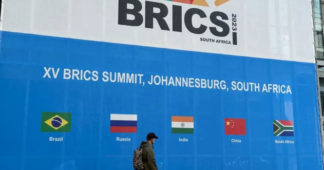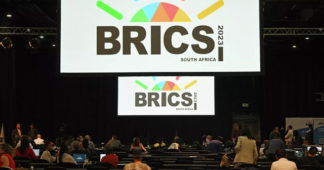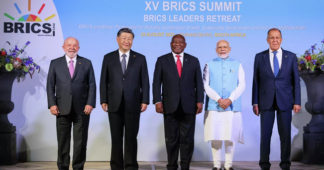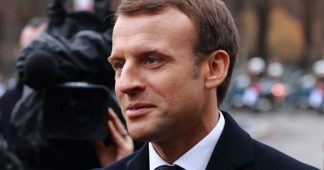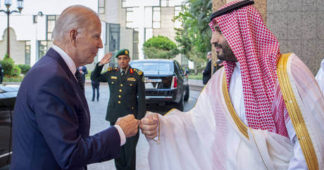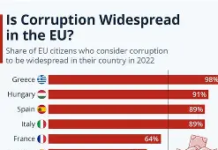By Oleg Barabanov
Jul 1, 2024
This year, Russia will be hosting the BRICS summit in October in Kazan. Our governmental circles, our ministries and our NGOs are all preparing for the summit. It is considered the key foreign policy event in Russia this year. The top political question, as I personally see it, could be with regards to greater solidarity between the BRICS countries in the wake of the enlargement, and as new members have been invited to join the club. Their leaders will be present as new BRICS members. They have to adapt to the already existing structure of the agenda of the BRICS countries. So, the solidarity of the members is the key factor that could be proposed by Russia, and it could be developed in other presidencies of the BRICS in the coming years.
For the moment, if we see BRICS as an institutional structure, it is very important on the symbolic level as a symbol of a non-Western agreement or cooperation among the major non-Western countries. All of the BRICS summits’ annual declarations are very important in promoting a new set of values, a new set of principles for cooperation, for justice and equality in international relations, for the fight against poverty and so on, and for proposing some new decisions among the non-Western countries. The symbolic value of the BRICS was strengthened by the fact that immediately after February 24, 2022, many other non-Western countries expressed an interest in joining BRICS. Those countries had not done so previously, but now in a totally changed geopolitical situation, they decided that it would better suit their national interests to became members of the main non-Western political club.
So, the symbolic attractiveness and strength of the BRICS is, without a doubt, a real fact of political life in the current world. However, we must ask if it’s possible to develop (and transform, if necessary) the BRICS to make it a more real and efficient political, economic and financial power at the global level. To achieve this, what is important from my personal point of view, I repeat, is to strengthen the internal solidarity among the BRICS members. If an international structure could be effective at the global level now, in the current situation, the strength of the organizations doesn’t just indicate that good symbolic values were written in the Summit Declarations; it means there is real solidarity in terms of politics and economics among the members.
If we compare the BRICS with many other formats, like the G7 within the West, we are still at the beginning of our process. Now already for several years, the BRICS has been operating the New Development Bank as a new financial institution. This is an important step (but only the first) on the way to transforming the BRICS from a symbolic into a real power. Such a power could provide genuinely non-Western instruments and mechanisms to support and sustain development strategies and projects in the countries of the Global South and the Non-West.
In this context, one of the key challenges and possible strategic objectives for the future of BRICS is its role in the ongoing process of de-dollarising the global financial system.
The issue of de-dollarisation has recently been increasingly discussed in the expert and professional community. The actions of the United States and other Western countries to freeze Russian assets and their possible confiscation have had a serious impact on confidence in dollar-denominated financial instruments in other countries. The number of international trade transactions carried out not in dollars, but in national currencies, is growing both proportionally and in absolute terms. This trend is likely to continue in the medium term.
On the other hand, de-dollarisation has been talked about as a desirable goal, especially in non-Western and developing countries, for a long time. However, the situation as a whole, by and large, remains the same. Is it possible to do something in this regard, given the changed geopolitical and geo-economic conditions? Do the countries of the global non-West and South have sufficient political will to do this? Will the business community in these countries support this trend? All these questions seem extremely important.
In this context, natural interest is drawn to the activities and initiatives of the BRICS in the financial sector. I remember how a year ago, on the eve of the BRICS summit in South Africa, one could observe a very interesting media and expert discussion. Its essence was that in the irreversibly changing conditions of the modern world, it would be desirable for the BRICS to take a qualitatively new step in their financial policy. To set a medium-term goal of creating a single BRICS currency, or think through mechanisms to create a currency basket from the currencies of the BRICS countries, as well as their own payment mechanisms and systems.
Against the backdrop of these discussions, the actual results of last year’s BRICS summit in Johannesburg turned out to be much more modest. If in the political sphere the BRICS put forward a truly large-scale and ambitious programme to expand its membership, then with regards to financial issues the summit limited itself to only instructing the finance ministers of the BRICS member countries to work on the issue of increasing the efficiency of settlements in national currencies in trade between BRICS members. There was no mention of any single currency (even as a far-reaching goal) in the official documents of last year’s summit. Thus, the aforementioned expectations before its implementation turned out to be extremely high, and at least at this stage of development, perhaps unrealistic.
The reason for this, in our opinion, may lie in the fact that none of the BRICS countries are ready to give up full sovereign control over their own currencies. This situation is unlikely to change in the near future. In addition, as the EU experience in introducing the euro shows, in order for the single currency to be stable and effective, it is necessary to harmonize the budgetary, tax and generally financial systems of the participating countries. It seems that for BRICS at this stage of its development and, we repeat again, with the level of solidarity that sometimes does not go beyond symbolic value declarations, this is also an unrealistic task.
In this regard, the question arises: is it possible to do anything in this area, besides facilitating the use of national currencies? Now, before the BRICS summit in Russia, one can observe a new expert discussion in this regard. One of the proposals that is currently being voiced is related to the introduction and distribution of digital currencies by the BRICS countries. A pool of these digital currencies, combined with a pool of national payment instruments (which should become interoperable), could be the first step towards truly strengthening de-dollarisation within the BRICS and broader non-Western world. At the same time, they will retain full sovereign control over the traditional currencies of the BRICS countries.
Since it is clear that one of the key financial actors in the non-Western world is China, and a lot will depend on its position here, it is proposed as a preliminary option to use the digital yuan for payments within the framework of the Belt and Road project. Since all the initiative of this programme are, in the good sense of the term, China-centric, and China retains sufficient control over investments, there are many risks from the transformation of the yuan into a new reserve currency (related, among other things, to China’s negative trade balance with a number of major partners) which will not be of significant importance. At the same time, as a platform for the testing of the digital yuan, the Belt and Road programme may look quite promising. Its experience can be used by other BRICS countries in their eventual strategy to develop digital currencies.
The future will show how practically feasible these proposals from the current stage of the discussion on de-dollarization will be. The upcoming BRICS summit in Russia will provide the first answers to these questions.
We remind our readers that publication of articles on our site does not mean that we agree with what is written. Our policy is to publish anything which we consider of interest, so as to assist our readers in forming their opinions. Sometimes we even publish articles with which we totally disagree, since we believe it is important for our readers to be informed on as wide a spectrum of views as possible.
